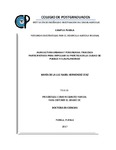Agricultura urbana y periurbana: procesos participativos para impulsar su práctica en la ciudad de Puebla y Cuautlancingo.
Abstract
Los procesos de empobrecimiento en áreas urbanas y periurbanas crean desafíos para garantizar la seguridad alimentaria en la población con pobreza y vulnerabilidad. Una de las alternativas de solución es la práctica de agricultura urbana y periurbana (AUP). La presente investigación buscó contribuir al conocimiento sobre factores que influyen en la práctica de la AUP y la identificación de estrategias metodológicas útiles en su promoción a nivel doméstico. El objetivo fue identificar los factores que influyen en el establecimiento y práctica de la AUP en huertos domésticos en la zona metropolitana de Puebla. La investigación tuvo dos ejes: 1) exploración de la situación de la AUP en cuatro colonias marginadas de la ciudad de Puebla, con el uso de métodos cuantitativos con la aplicación de una encuesta; 2) la facilitación de un proceso de intervención educativo para la instalación de huertos domésticos en la ciudad de Puebla y el área conurbada del municipio de Cuautlancingo, mediante estrategias de investigación acción participativa, diario de campo, encuesta, entrevistas semiestructuradas y talleres participativos. En el análisis de datos se usó estadística paramétrica y no paramétrica. Se encontró que los factores que influyen en la práctica de cultivo de hortalizas en el hogar son el espacio disponible y el tipo de propiedad de la vivienda, la procedencia rural, el interés y motivación de la persona responsable del cuidado del huerto, la valoración de la producción de alimentos, y el acceso a insumos. Se identificó que las mujeres son las principales actoras dentro de los hogares en promover el huerto, no obstante, la dinámica del hogar y su participación en la generación de ingresos a través del mercado laboral les dificulta el cuidado del huerto de manera constante. Los programas públicos que promueven la AUP para contribuir a la seguridad alimentaria deben incluir procesos participativos para superar de manera colectiva y horizontal los factores limitantes de la práctica de huertos en hogares con pobreza desde la perspectiva y realidad de los sujetos beneficiarios. _______________ URBAN AND PERIURBAN AGRICULTURE: PARTICIPATORY PROCESSES TO IMPULSE ITS PRACTICE IN PUEBLA CITY AND CUAUTLANCINGO. ABSTRACT: The processes of impoverishment in urban and peri-urban areas create challenges to guarantee food security in the population with poverty and vulnerability. One of the alternative solutions is the practice of urban and peri-urban agriculture (UPA). The present research sought to contribute to the knowledge about factors that influence the practice of UPA and the identification of useful methodological strategies in its promotion at the domestic level. The objective was to identify the factors that influence the establishment and practice of UPA in homegardens in the metropolitan area of Puebla City. The investigation had two axes: 1) exploration of the situation of the UPA in four marginalized colonies of the city of Puebla, with the use of quantitative methods with the application of a survey; 2) the facilitation of an educational intervention process for the installation of home gardens in the city of Puebla and the conurbated area of the municipality of Cuautlancingo, through participatory action research strategies, field diary, survey, semi-structured interviews and participatory workshops. In the data analysis, parametric and non-parametric statistics were used. It was found that the factors that influence the practice of growing vegetables in the home are the space available and the type of tenure of the home, the rural origin, the interest and motivation of the person responsible for the care of the garden, the valuation of food production, and access to inputs. It was identified that women are the main actors inside homes promoting the presence of the homegarden, however, the dynamics of the household and its participation in the generation of income through the labor market make it difficult for them to care of the homegarden constantly. Public programs that promote UPA to contribute to food security must include participatory processes to collectively and horizontally overcome the limitant factors of the practice of homegardens in households with poverty from the perspective and reality of the beneficiaries.
Collections
- Tesis MC, MT, MP y DC [398]
The following license files are associated with this item:


